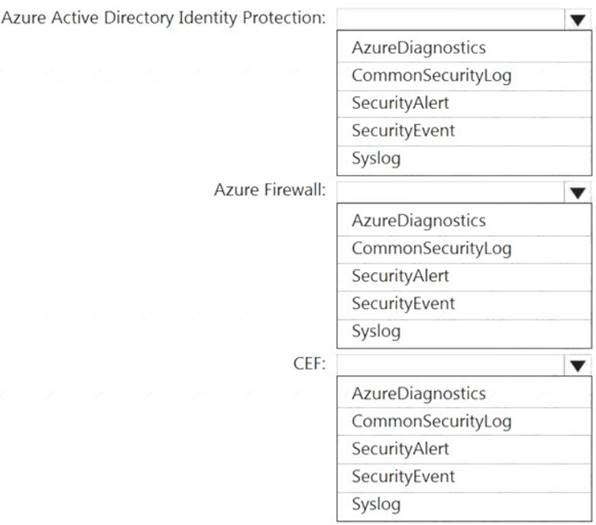- (Exam Topic 4)
You have an Azure Active directory tenant that syncs with an Active Directory Domain Services (AD DS) domain.
You plan to create an Azure file share that will contain folders and files.
Which identity store can you use to assign permissions to the Azure file share and folders within the share? To answer, select the appropriate options in the answer area.
NOTE: Each correct selection is worth one point.
Solution:
Does this meet the goal?
Correct Answer:A
- (Exam Topic 4)
You have Azure virtual machines that have Update Management enabled. The virtual machines are configured as shown in the following table.
You schedule two update deployments named Update1 and Update2. Update1 updates VM3. Update2 updates VM6.
Which additional virtual machines can be updated by using Update1 and Update2? To answer, select the appropriate options in the answer area.
NOTE: Each correct selection is worth one point.
Solution:
Update1: VM1 and VM2 only
VM3: Windows Server 2016 West US RG2 Update2: VM4 and VM5 only
VM6: CentOS 7.5 East US RG1
For Linux, the machine must have access to an update repository. The update repository can be private or public.
References:
https://docs.microsoft.com/en-us/azure/automation/automation-update-management
Does this meet the goal?
Correct Answer:A
- (Exam Topic 4)
Note: This question is part of a series of questions that present the same scenario. Each question in the series contains a unique solution that might meet the stated goals. Some question sets might have more than one correct solution, while others might not have a correct solution.
After you answer a question in this section, you will NOT be able to return to it. As a result, these questions will not appear in the review screen.
You have an Azure Subscription. The subscription contains 50 virtual machines that run Windows Server 2012 R2 or Windows Server 2016.
You need to deploy Microsoft Antimalware to the virtual machines. Solution: You add an extension to each virtual machine.
Does this meet the goal?
Correct Answer:A
You can use Visual Studio to enable and configure the Microsoft Antimalware service. This entails selecting Microsoft Antimalware extension from the dropdown list under Installed Extensions and click Add to configure with default antimalware configuration.
References:
https://docs.microsoft.com/en-us/azure/security/fundamentals/antimalware
- (Exam Topic 4)
You need to enable Advanced Data Security for the SQLdb1 Azure SQL database. The solution must ensure that Azure Advanced Threat Protection (ATP) alerts are sent to User1@contoso.com.
To complete this task, sign in to the Azure portal and modify the Azure resources.
Solution: In the Azure portal, type SQL in the search box, select SQL databases from the search results then select SQLdb1. Alternatively, browse to SQL databases in the left navigation pane.
In the Azure portal, type SQL in the search box, select SQL databases from the search results then select SQLdb1. Alternatively, browse to SQL databases in the left navigation pane. In the properties of SQLdb1, scroll down to the Security section and select Advanced data security.
In the properties of SQLdb1, scroll down to the Security section and select Advanced data security.  Click on the Settings icon.
Click on the Settings icon. Tick the Enable Advanced Data Security at the database level checkbox.
Tick the Enable Advanced Data Security at the database level checkbox.  Click Yes at the confirmation prompt.
Click Yes at the confirmation prompt. In the Storage account select a storage account if one isn’t selected by default.
In the Storage account select a storage account if one isn’t selected by default. Under Advanced Threat Protection Settings, enter User1@contoso.com in the Send alerts to box.
Under Advanced Threat Protection Settings, enter User1@contoso.com in the Send alerts to box.  Click the Save button to save the changes.
Click the Save button to save the changes.
Reference:
https://docs.microsoft.com/en-us/azure/azure-sql/database/advanced-data-security
Does this meet the goal?
Correct Answer:A
- (Exam Topic 4)
You have an Azure Sentinel workspace that has the following data connectors:  Azure Active Directory Identity Protection
Azure Active Directory Identity Protection Common Event Format (CEF)
Common Event Format (CEF)  Azure Firewall
Azure Firewall
You need to ensure that data is being ingested from each connector.
From the Logs query window, which table should you query for each connector? To answer, select the appropriate options in the answer area.
NOTE: Each correct selection is worth one point.
Solution:
Graphical user interface, application, table Description automatically generated
Does this meet the goal?
Correct Answer:A